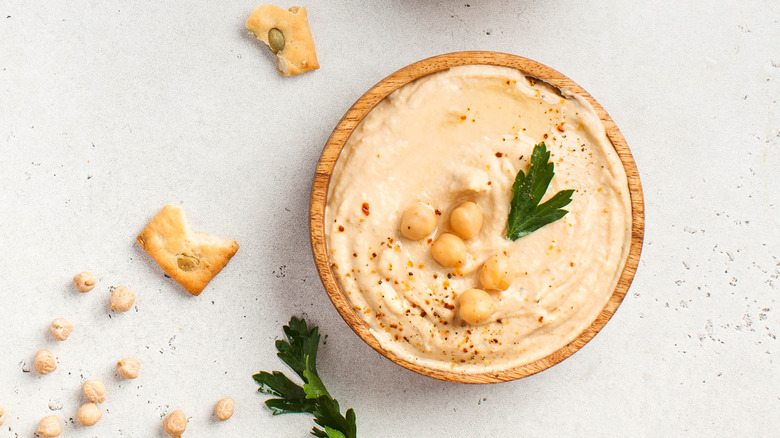The Secret Ingredient For The Smoothest Hummus Is Already In Your Pantry
Your pantry is filled with wonders. It might be overpacked, messy, or disorganized, but it also holds valuable treasures whose versatile uses can change your culinary world. One such treasure is baking soda. Baking soda is a magical ingredient that effortlessly raises bakes, crisps up potatoes, and astoundingly revitalizes stained pots and pans. It also has a lesser-known trick up its sleeve — it can be used while making hummus to create the smoothest spread imaginable.
The secret to using baking soda in hummus is to introduce it to the chickpeas before any blending or whizzing occurs, either by incorporating it while soaking the dried beans or as you boil them. A dash of baking soda can make the difference between a luscious smooth spread and a grainy dip. How is this possible? The answers lie in the pH levels. But before trying this trick, it's important to understand that this method works on dried chickpeas (or garbanzo beans), not the canned variety.
The baking soda science
To understand how baking soda divinely smooths out your hummus, it's best to begin with a little chemistry lesson. A pH scale measures from 0 to 14 and tells us how acidic an object or solution is – with 0 being the most acidic and 14 being the most basic. Baking soda has a pH level of approximately 8.3 and, when mixed with water, is regarded as an alkaline solution as it neutralizes acidity.
Chickpeas are not remarkably high in acidity (usually in the 6-7 range); however, they do contain a soluble fiber named pectin. Pectin gives the chickpea bean its structural integrity, and this is what you want to break down if you wish to achieve a smoother hummus. The alkaline pH in baking soda breaks the larger pectin into smaller molecules and rapidly speeds up the softening process.
A touch of baking soda added to the chickpeas while they soak, or a dash while they boil, can aid in weakening the robust structure of the chickpeas, turning them into velvety beans ideal for creating a dreamy hummus.
Smoothing it all out
While soaking your chickpea beans with a dash of baking soda will aid in a creamier effect, it's also suggested that boiling water aids in an even faster softening of the chickpea pectin. This is because baking soda breaks down into three compounds (sodium carbonate, water, and carbon dioxide) when boiled with water. Sodium carbonate has a much higher pH than baking soda and consequently breaks down the pectin faster. While this method will result in a smoother bean, it's important to know that cooking chickpeas with baking soda may deplete their vitamin B1 levels. Otherwise known as thiamin, vitamin B1 is crucial in breaking down nutrients for energy.
When using baking soda to smooth out your hummus, there is one crucial aspect to keep in mind, and that is age. Baking soda's powers can diminish over time, and once opened, the USDA recommends that you use it within six months for best results. You can test the freshness of baking soda with an easy lemon juice trick. When making hummus, you should also consider the age of the chickpeas. Older dried chickpeas are typically firmer than fresh, so they may need longer soaking or a longer cooking time.


